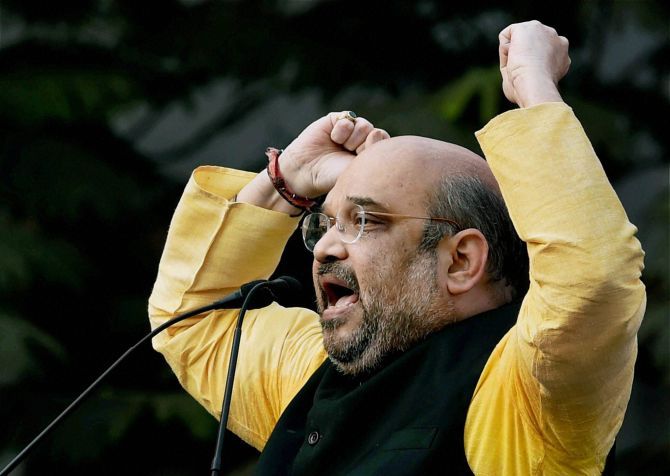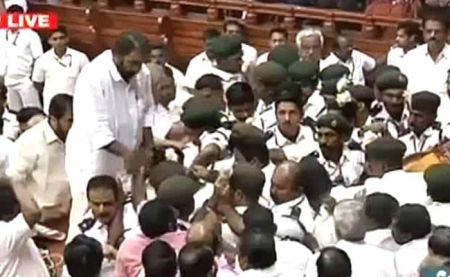'Amit Shah was, briefly, a stockbroker before devoting himself to politics. By instinct or training, he knows the value of keeping blue chips in one's portfolio,' says T V R Shenoy.
 For four days in February moving from Malayalam news channels to those in English and Hindi felt like moving from one universe to another. The former provided saturation coverage of the supposed crisis in the Communist Party of India-Marxist following V S Achuthanandan's dramatic exit from the CPI-M's state conference in Alappuzha; apparently nothing else was happening elsewhere.
For four days in February moving from Malayalam news channels to those in English and Hindi felt like moving from one universe to another. The former provided saturation coverage of the supposed crisis in the Communist Party of India-Marxist following V S Achuthanandan's dramatic exit from the CPI-M's state conference in Alappuzha; apparently nothing else was happening elsewhere.
But if the English and Hindi channels devoted any time at all to discussing factionalism in the Marxist camp I must have missed it.
Keralites will probably blame the national media's obsession with Delhi and Mumbai for this virtual blackout. That is wrong.
The same channels spoke, respectfully, of Speaker G Karthikeyan's passing on March 7, much less respectfully of the nexus revealed by the 'Hummer Murder Case', and, with absolutely zero respect, of everything that happened in the assembly on Friday, March the 13.
It is not Kerala that is being ignored by the national media, but the Marxists. And there is reason to that.
In 2004 the CPI-M won 43 seats in the general election, forming a formidable 60-strong block of votes in the Lok Sabha with its Left Front allies. In May 2006 the Left wrested power from the Congress-led United Democratic Front in Kerala, simultaneously winning a record seventh straight term in West Bengal. This was the zenith of the CPI-M's influence.
In 2009 the CPI-M's Lok Sabha tally fell to 16, and that of the Left Front as a whole to 24. In 2011 the electoral cycle brought the UDF back to power in Kerala, and at the same time brought an end to 34 years of Left Front rule in West Bengal.
In 2014 the CPI-M fell to just nine seats (five from Kerala). The Communist Party of India was wiped out in West Bengal, and has been reduced to a single Lok Sabha MP (again from Kerala, C N Jayadevan winning Thrissur). As for the Revolutionary Socialist Party, its sole victory -- Kollam in, you guessed it, Kerala -- came with N K Premachandran defeating the CPI-M's M A Baby.
Harsh though it may sound in Thiruvananthapuram and Kochi, from the perspective of Delhi, of Mumbai, and even, let us be honest, of Kolkata, the Left in general and the CPI-M in particular are in decline, and there is little point in devoting newsprint or airtime on them.
Is there worse in store? Possibly.
Bharatiya Janata Party President Amit Shah was, briefly, a stockbroker before devoting himself to politics. By instinct or training, he knows the value of keeping blue chips in one's portfolio.
There are 80 Lok Sabha MPs from Uttar Pradesh, 48 from Maharashtra, 42 from West Bengal, 40 from Bihar, 39 from Tamil Nadu, and 29 from Madhya Pradesh. Add them up, and you reach 278. Over half our MPs are elected by India's six electoral blue chips.
In 2014, the BJP won 71 seats in Uttar Pradesh, 23 in Maharashtra, 27 in Madhya Pradesh, and 22 in Bihar. (Its allies -- the Apna Dal in Uttar Pradesh, the Shiv Sena in Maharashtra, the Lok Jan Shakti Party and others in Bihar -- won more.) But it won just two seats in West Bengal and a single seat in Tamil Nadu.
From Amit Shah's perspective the BJP must now concentrate on West Bengal and Tamil Nadu. The party does not have a hope of sweeping either state any time soon, but it is necessary to tell voters in both that the BJP is there for the long term, and, hopefully, establish itself as the second largest party.
The BJP will thus take the upcoming local body polls in West Bengal seriously. The Kolkata Municipal Corporation elections are scheduled for April 18, while 92 other municipalities go to the polls on April 25. The Trinamool Congress should register victories in most places, but the truly interesting question is if the BJP can upset the CPI-M to be the runner-up.
Logically, the CPI-M should reach out to the Congress (which is also at loggerheads both with the BJP and with the Trinamool Congress). But can you have a situation where Marxists and Congressmen are allies in Kolkata yet foes in Thiruvananthapuram?
Scared about losing its remaining bastions in West Bengal and riven by factionalism in Kerala, the CPI-M has lost its bearings. What India saw on Friday the 13th was a party struggling to maintain its relevance by keeping itself in the headlines at almost any cost. And doing so, with all due respect to my friends in the Left, in the most thoughtless manner possible.
What exactly has the CPI-M achieved? Here are its three 'achievements'.

First, it has left every thoughtful Indian nauseated. As a commentator on one Hindi channel observed, violence has been seen in other Vidhan Sabhas, in Uttar Pradesh for instance, but vandalism always stopped at the Speaker's chair. That 'Lakshman-rekha' has been crossed.
Parliamentary privilege says that a legislator can't be prevented from going to the House, and that the Speaker must be informed if a member's arrest is sought even on a criminal charge. Here the CPI-M tried to prevent the Speaker himself from entering!
The educated middle class in Kerala wants law and order to be upheld. Did the CPI-M consider the effect of showing its MLAs throwing punches -- even biting! -- inside the assembly chamber?
Second, the CPI-M's vandalism drew attention away from K M Mani, both the man and his budget. The man stands accused of allegedly accepting a bribe from bar owners following the imposition of prohibition. The finance minister was forced to raise taxes on a variety of items -- including rice and wheat -- to make up the loss of revenue from alcohol sales.
K M Mani should have been doubly unpopular, both for the alleged corruption and for the enhanced taxes. Incredibly, the CPI-M has saved him from the dual dose of embarrassment.
Third, did the CPI-M consider what would happen if the budget were stalled? When the financial year ends, the government of Kerala would lack the authority to draw a single rupee from the treasury; salaries would not be paid, and public servants -- from policemen to garbage collectors -- would probably go on strike.
To prevent chaos, the Union government would use Article 356, dismiss the state government, and get Kerala's budget passed by Parliament.
Do the Marxists truly want to foist President's Rule on Kerala while Narendra Modi is prime minister?
The CPI-M has lost its bearings under Prakash Karat's leadership. If it makes the news at all, then it is for all the wrong reasons as on that dreadful Friday the 13th.
The truth -- given the frailty and the factionalism of the BJP in the state -- is that Kerala's only options are choosing between the UDF's fiscal wrongdoing and the Left Democratic Front's physical wrongdoing.











 © 2025
© 2025